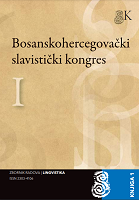Govor Bošnjaka u Turskoj: Fonetsko-fonološke osobenosti
The Dialect of Bosniaks in Turkey: Phonetic and Phonological Features
Author(s): Alma Genjac-NakičevićSubject(s): Phonetics / Phonology, Sociolinguistics, South Slavic Languages
Published by: Slavistički komitet BiH
Keywords: Bosnian language; dialectology; speech sounds; accent (linguistics);
Summary/Abstract: The dialectology of Bosnian language does not have yet information about the speech of multitude of the Bosniak Diaspora in Turkey, even estimated at approximately four million dwellers. The study of Bosniaks’ speech in Turkey belongs to one of the priorities of our dialectology, bearing in mind the importance of such data for the linguistics and for the history and culture of the people of Bosnia and Herzegovina. Dialectological and other studies of Bosnian language in a non-Slavic (Turkish) environment should not be delayed anymore, in order to prevent complete assimilation and losing such oasis forever. The material for this work comes from the speech of Halilbeylia Bosniaks (the Izmir region), and the survey has been encompassed other places in Turkey massively populated with dwellers of Bosniak origin, such as: Adapazari (a few villages and a part of the urban population), Istanbul (Bayrampasa, Pendik quarters... ), Karamursel (the town and surrounding villages), Bursa (the city and the large village of İnegöl), etc. The paper itself is offering phonetic and phonological peculiarities of Bosniaks’ speech in Turkey. By doing so, it can be placed within the dialectology of Bosnian language, but also belonging to the areas of phonology and sociolinguistics. A speech that immigrants had brought from their homeland even to this date was largely preserved and contains numerous archaisms, out of which determining the origin of certain families is possible: one group of speakers preserved the parent West and Central-Bosnian ikavian dialect, the other group did so with the East-Herzegovinian jekavian speech, the third group preserved the archaic Northeast Bosnian accentuation and the specific Yat replacement with a multitude of ikavian speech elements (jošte će lipše vam kasti; ne smiš) and ekavian speech elements (ovde). It makes clear that speech of these emigrant groups has even accepted the characteristics of Turkish language, with which it stays in contact, and to whose influence is strongly exposed, both at the lexical level (many of Turkish origin expressions unknown to the Bosnian dialects), and at other linguistic levels and layers specific for bilingual communities.
Journal: Bosanskohercegovački slavistički kongres
- Issue Year: I/2012
- Issue No: 1
- Page Range: 165-169
- Page Count: 5
- Language: Bosnian

